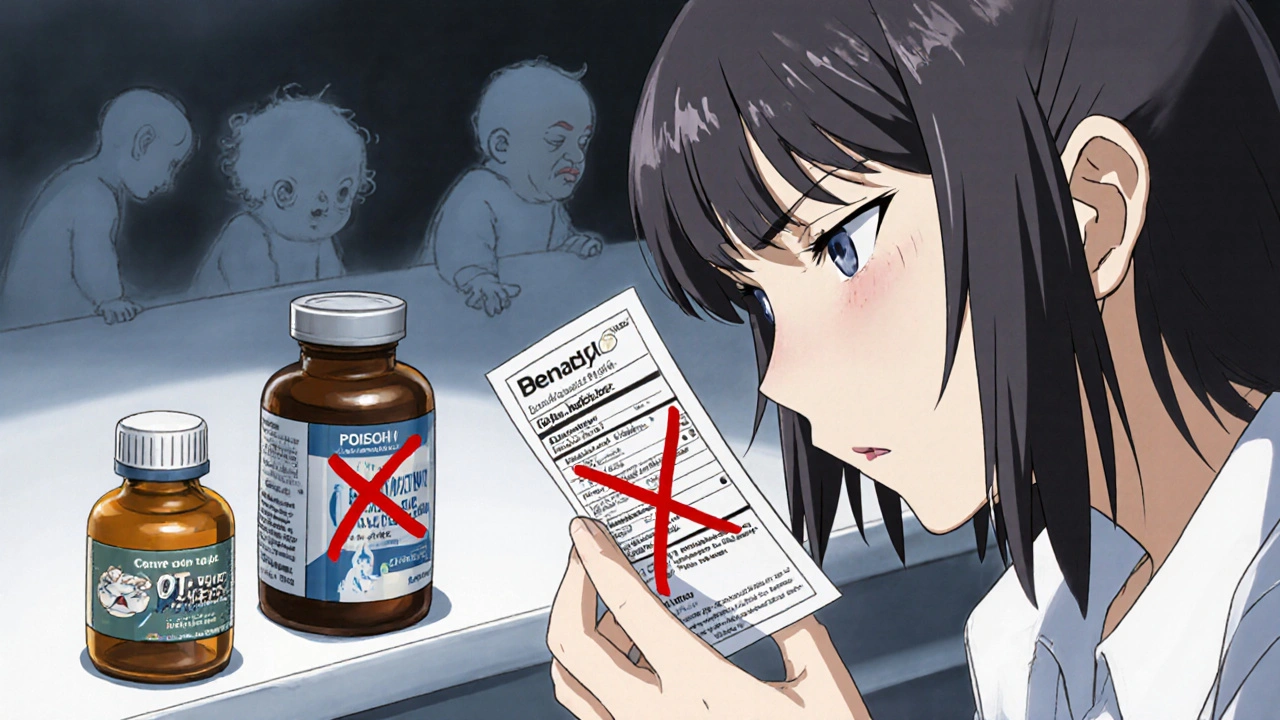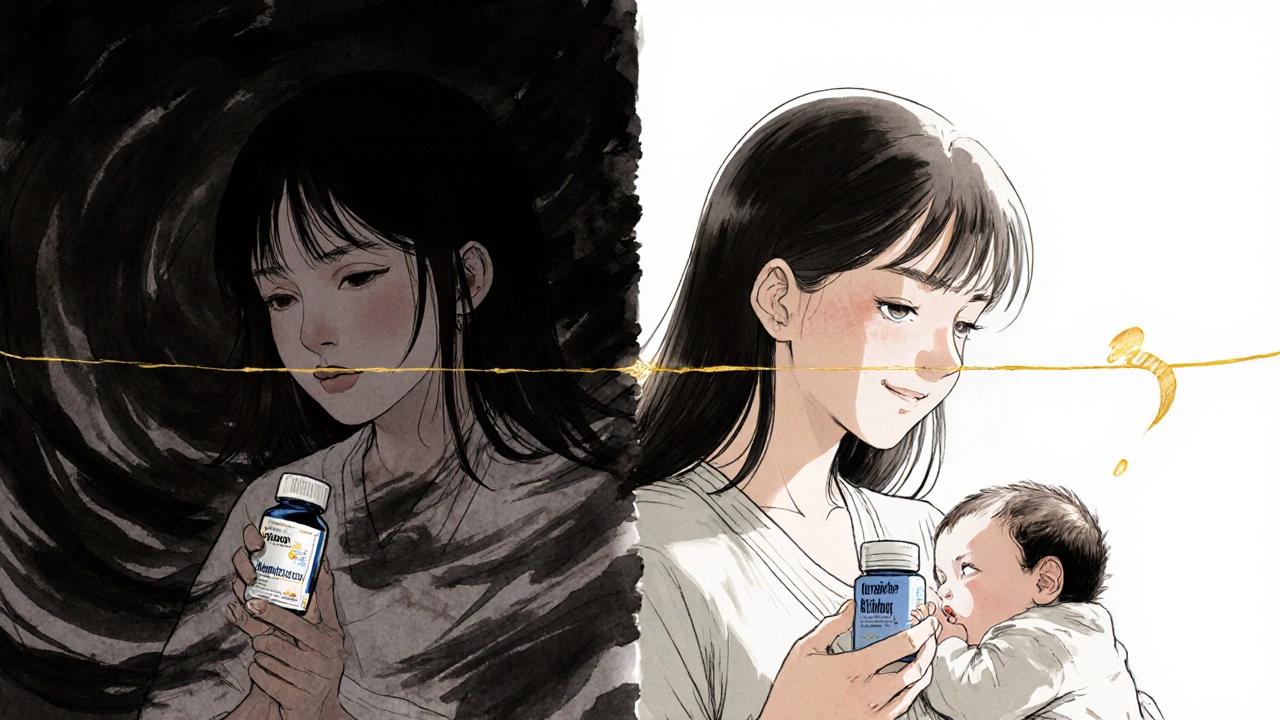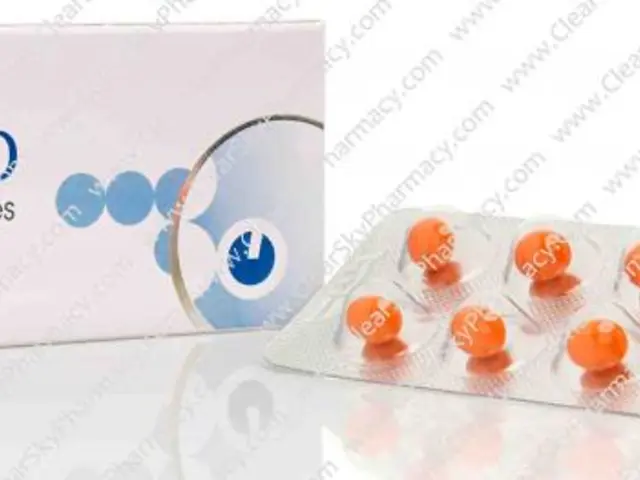When you're nursing, every pill you take feels like a risk. You want to feel better-whether it’s from allergies, a headache, or a sinus infection-but you also don’t want to hurt your baby. The good news? Most common antihistamines and pain relievers are safe when used correctly. The bad news? Not all of them are. And mixing up the wrong ones can lead to drowsy babies, poor feeding, or worse.
What Makes a Medication Safe While Breastfeeding?
It’s not about whether the drug gets into breast milk-it does, a little. It’s about how much, how fast, and what it does to your baby. The safest medicines have low transfer rates, short half-lives, and no known side effects in infants. For example, acetaminophen and ibuprofen pass into milk in tiny amounts-less than 1% of your dose-and don’t affect most babies. Second-generation antihistamines like loratadine and cetirizine are even better: they barely cross into milk at all.
First-generation antihistamines like diphenhydramine (Benadryl) or chlorpheniramine are different. They’re designed to cross the blood-brain barrier, which is why they make you sleepy. That same trait means they can make your baby sleepy too. And if your baby sleeps more than usual, misses feeds, or seems listless, that’s not just tiredness-it’s a red flag.
The Safest Antihistamines for Nursing Moms
Stick with these three: loratadine (Claritin), cetirizine (Zyrtec), and fexofenadine (Allegra). These are second-generation antihistamines, meaning they’re less likely to cause drowsiness in you or your baby. Studies show loratadine transfers at just 0.04% of your dose. Fexofenadine? Only 0.02%. That’s practically nothing.
They work just as well as the old-school options for runny noses, itchy eyes, and sneezing. And unlike diphenhydramine, they don’t build up in your system. You can take them daily without worry.
But here’s the catch: many cold and allergy meds combine antihistamines with decongestants, cough suppressants, or pain relievers. Check the label. If it says “multi-symptom,” “PM,” or “Nighttime,” it likely contains diphenhydramine or doxylamine-both risky for nursing. Stick to single-ingredient versions.
Pain Relievers: What’s Safe, What’s Not
For pain or fever, acetaminophen (Tylenol) is the gold standard. It’s in breast milk at 1-2% of your dose. No studies have linked it to any issues in babies. Ibuprofen (Advil, Motrin) is even better in some ways-it’s highly protein-bound, so very little gets into milk, and it’s cleared quickly. Studies show levels in milk are under 0.8% of your dose.
But naproxen? Avoid it. It stays in your body longer-up to 17 hours-and transfers at around 7% of your dose. There are real reports of babies developing anemia, vomiting, or bleeding issues after long-term exposure. The American Academy of Family Physicians specifically warns against it.
And forget opioids. Codeine, hydrocodone, oxycodone, tramadol-they’re not just risky, they’re dangerous. Some babies metabolize them into morphine faster than normal, leading to life-threatening breathing problems. Even morphine and hydromorphone should only be used for a day or two under strict supervision.

What About Natural Remedies and OTC Mixes?
Just because something’s “natural” doesn’t mean it’s safe. Herbal teas, supplements, and home remedies aren’t regulated. Some, like chamomile or peppermint, are fine in tea form. But others-like echinacea, goldenseal, or high-dose vitamin C-have no safety data in breastfeeding. Don’t assume.
And watch out for combination OTC products. A “cold and flu” tablet might have acetaminophen, a decongestant, and an antihistamine-all in one pill. You might think you’re helping yourself, but you’re giving your baby three drugs at once. Always read the active ingredients. If you see “diphenhydramine,” “doxylamine,” or “chlorpheniramine,” put it back.
Real-Life Scenarios: What Works
Meet Sarah. She’s been nursing her 4-month-old for months. Her allergies flare every spring. She used to take Benadryl because it “worked fast.” But her baby started sleeping through feedings. She switched to cetirizine. Within a day, her baby was back to normal-feeding well, alert, gaining weight. No side effects.
Then there’s Maria. She had a wisdom tooth pulled. Her dentist gave her hydrocodone. She took two pills over two days. Her baby became unusually sleepy, had trouble latching, and didn’t wake up for a night feed. She called her pediatrician. They told her to stop the opioid and switch to ibuprofen. The baby bounced back in 24 hours.
These aren’t rare cases. They’re common. And they’re preventable.
How to Take Medications Safely
- Take the lowest effective dose. You don’t need to max out the bottle.
- Time your doses. Take meds right after a feeding so your baby gets the least amount by the next feed.
- Watch your baby. Look for changes in sleep, feeding, fussiness, or breathing.
- Don’t mix meds. Check every OTC bottle-even cough syrups and sleep aids-for hidden antihistamines.
- When in doubt, call your doctor or a lactation consultant. Don’t guess.
Also, avoid alcohol with any of these meds. Alcohol slows how your body clears the drugs and increases drowsiness in both you and your baby.

When to Worry
You don’t need to panic every time you take a pill. But if your baby shows any of these signs after you take a medication, contact your pediatrician:
- Sleeping more than usual or hard to wake for feeds
- Poor feeding or refusing the breast
- Unusual fussiness or jitteriness
- Slow or shallow breathing
- Yellowing skin (jaundice) or dark urine
These are rare with safe meds-but they happen. And catching them early saves lives.
What Experts Agree On
Every major source-AAFP, Mayo Clinic, LactMed, the Breastfeeding Network-says the same thing: loratadine, cetirizine, fexofenadine, acetaminophen, and ibuprofen are safe. That’s it. Everything else needs caution.
The outdated advice that “antihistamines are contraindicated during breastfeeding”? That’s from the 1990s. Science has moved on. We now know that the real danger isn’t the medication-it’s the misinformation.
Don’t rely on old nursing manuals or random forum posts. Use trusted sources: LactMed (from the NIH), the AAFP guidelines, or your pediatrician’s drug reference.
Final Takeaway
You don’t have to suffer through allergies or pain while nursing. There are safe, effective options. But you have to choose them wisely. Stick to the proven ones: loratadine, cetirizine, fexofenadine, acetaminophen, and ibuprofen. Avoid anything with diphenhydramine, naproxen, or opioids unless your doctor says it’s absolutely necessary.
And remember: your baby doesn’t need you to be perfect. They need you to be healthy. Taking the right medicine at the right time isn’t selfish-it’s responsible.
Can I take Benadryl while breastfeeding?
Benadryl (diphenhydramine) can pass into breast milk and may cause drowsiness, poor feeding, or even irritability in your baby. It’s not recommended for regular use while nursing. If you need it for a severe allergic reaction, use it once and monitor your baby closely. Better alternatives like loratadine or cetirizine are safer for ongoing use.
Is Tylenol safe while breastfeeding?
Yes, acetaminophen (Tylenol) is considered one of the safest pain relievers for nursing mothers. Only a tiny amount enters breast milk-about 1-2% of your dose-and no adverse effects have been reported in breastfed infants. It’s the go-to choice for headaches, fever, or postpartum pain.
Can I take ibuprofen while breastfeeding?
Yes, ibuprofen is safe and often preferred over other NSAIDs while breastfeeding. It transfers into milk in very low amounts-less than 0.8% of your dose-and is cleared quickly from your system. It’s especially useful for inflammation, cramps, or after delivery. Long-term use is still fine, but always stick to the lowest effective dose.
What about Zyrtec or Claritin-do they cause drowsiness in babies?
Cetirizine (Zyrtec) and loratadine (Claritin) are second-generation antihistamines that rarely cause drowsiness in babies. Studies show almost no transfer into breast milk, and there are no documented cases of sedation or feeding problems in infants when used at standard doses. Some mothers report mild drowsiness in themselves, but it’s uncommon in babies.
Is it safe to take allergy shots while breastfeeding?
Yes, allergy immunotherapy (allergy shots) is considered safe during breastfeeding. The vaccines are given under the skin and don’t enter the bloodstream in amounts that affect breast milk. You can continue your regular allergy shots without stopping breastfeeding. Always inform your allergist that you’re nursing, though, so they can monitor for any unusual reactions.
Can I use nasal sprays or eye drops while breastfeeding?
Yes, most nasal sprays (like fluticasone or azelastine) and antihistamine eye drops (like ketotifen) are safe because they’re applied locally and absorbed minimally into your bloodstream. This means almost none reaches your breast milk. They’re often the best choice for targeted relief without systemic exposure.
What if my baby has a reaction to a medication?
If your baby becomes unusually sleepy, refuses to feed, has trouble breathing, or develops a rash after you start a new medication, stop the drug immediately and contact your pediatrician. Most reactions are mild and resolve quickly once the medication is stopped. Document what you took, when, and the symptoms-this helps your provider make the right call.
If you’re unsure about any medication, don’t guess. Call your doctor, pharmacist, or a lactation consultant. Most hospitals have lactation specialists who can check drug safety in seconds using up-to-date databases. You’re not alone in this-and you don’t have to suffer to protect your baby. Safe choices exist. You just need to know which ones.





Aidan McCord-Amasis
November 15, 2025 AT 21:30Ryan Airey
November 17, 2025 AT 02:01Chris Bryan
November 17, 2025 AT 20:42BABA SABKA
November 19, 2025 AT 00:26Ogonna Igbo
November 19, 2025 AT 19:40Jonathan Dobey
November 19, 2025 AT 20:43ASHISH TURAN
November 20, 2025 AT 23:27Hollis Hollywood
November 21, 2025 AT 09:34Adam Dille
November 21, 2025 AT 10:00